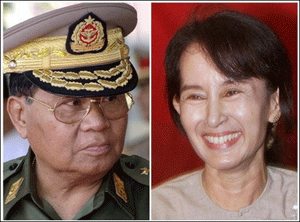UN Diplomat to Meet Junta Leaders; Than Shwe Ready to Meet Suu Kyi
The top US diplomat in Burma was summoned for rare talks on Friday with Burma's hardliner government a day after its leader announced a conditional offer to meet with detained democracy activist Aung San Suu Kyi.
 |
[Photo: AFP] |
Villarosa has been a vocal critic of the crackdown. During her visit, Villarosa was expected to repeat the US view that the regime must meet with democratic opposition groups and "stop the iron crackdown" on peaceful demonstrators, State Department spokesman Sean McCormack told reporters in Washington.
The talks were being held in Naypyidaw, the regime's remote capital carved out of the jungle about 385 kilometers (240 miles) north of Rangoon.
Hoping to deflect outrage over soldiers gunning down protesters, Burma's junta chief Snr-Gen Than Shwe announced that he was willing to talk with Suu Kyi, the democratic opposition leader—but only if she stops calling for international sanctions.
Than Shwe also insisted that Suu Kyi stop urging her countrymen to confront the military regime, state television and radio said in reporting on the conditions set by the junta leader during a meeting this week with UN special envoy Ibrahim Gambari.
The state media announcement came a few hours before Gambari briefed UN Secretary-General Ban Ki-moon in New York on his four-day trip seeking to persuade Burma's military leaders to end the crackdown on democracy activists.
Many governments have urged stern UN Security Council action against Burma, but permanent members China and Russia have ruled out any council action, saying the crisis did not threaten international peace and security.
"This issue does not belong to the Security Council," China's UN Ambassador Wang Gunagya said Thursday. "These problems still we believe are basically internal."
"No international imposed solution can help the situation," he added.
State media in Burma gave new figures on Thursday for the number of people arrested during last week's bloody assault by troops. The reports said nearly 2,100 people had been detained, with almost 700 already released.
The government has said 10 people were killed when security forces broke up the mass demonstrations, but dissident groups put the death toll at up to 200 and say 6,000 people were detained, including thousands of Buddhist monks who were leading the protests.
In reporting on Than Shwe's meeting with Gambari, state media quoted the general as saying that "Daw Aung San Suu Kyi has called for confrontation, utter devastation, economic sanctions and all other sanctions."
While Suu Kyi has previously voiced support for economic sanctions against the junta, she has not publicly called for the devastation of her homeland or the government.
"If she abandons these calls, Snr-Gen Than Shwe told Mr Gambari that he will personally meet Daw Aung San Suu Kyi," the state media report said.
The report's use of the title "daw" was a conciliatory gesture. "Daw" is a term of respect for older women in Burma and it was an unusually polite reference to Suu Kyi, a far cry from the usual way state media denigrates her as a foreign puppet or worse.
Reaction to the olive branch was mixed.
"I don't believe there's one iota of sincerity" in the junta's offer, Josef Silverstein, a retired Rutgers professor and Burma expert, said on Thursday in a telephone interview from Princeton, New Jersey.
But, Silverstein added, he thinks Suu Kyi will take up the offer, since she has requested such talks for over a decade.
Nyan Win, a spokesman for Suu Kyi's National League for Democracy party, scoffed at the general's proposal. "Applying such conditions shows the government is not really sincere about meeting her," he said.
Suu Kyi, who has spent nearly 12 of the last 18 years under house arrest, was awarded the 1991 Nobel Peace Prize for her democracy campaign. Her party won elections in 1990 but the junta refused to accept the results.
Burma has been ruled by the military since 1962. The current junta came to power after routing a 1988 pro-democracy uprising in bloodshed that killed at least 3,000 people.
- 'My Wife Died From Police Abuse,' Says Husband
- US Says Observer Conditions Don't Meet Int'l Standards
- 159 Observers to Monitor Burma Election
- Govt to Address Breaches of SSA-South Ceasefire: Aung Min
- Burma Investors Pin Hopes on Seminal Sunday
- Malaysia PM Leads 50-Strong Delegation to Burma
- US Congress to Assess Burma's Political Prisoner Issue
- Rangoon Woman in Police Station Death Plunge
- Burmese Legal System Remains Tool of Govt: AHRC
- Burmese Army Chief Defends Political Role
